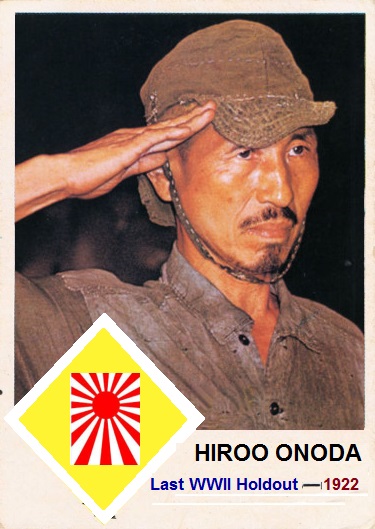
For most of us, World War II ended sixty-eight years ago. For two Japanese soldiers, it continued for another twenty-nine years. The longest holdout was Pvt. Teruo Nakamura (中村 輝夫), discovered quietly farming on Morotai Island, Indonesia, in December 1974. Born on Taiwan as Attun Palalin of the Amis tribe, and just an enlisted man, Nakamura wouldn't have had much of a chance of ending his days as a national hero in Japan, even if he hadn't already been doomed to be seen as a repeat of old news by a well-covered surrender nine months earlier.
That surrenderer was Second Lieutenant Hiroo Onoda (小野田 寛郎). Enlisting in the Japanese Imperial Army in 1942, at the age of 20, Onoda was given training as an intelligence officer. In late December 1944, he was sent to Lubang Island in the Philippines and given his next-to-last orders: Do everything possible to hinder enemy attacks on the island, and under no circumstances surrender or take your own life.
Ending up in command of a small squad with three soldiers under him, he did his best to follow those orders. Pamphlets and messages from family, informing the men that the war was over and asking them to return home, were found and studied but not trusted. One of the four soldiers walked away in 1949 and surrendered in 1950; another was killed in 1954 and a third in October 1972. Onoda continued alone until a fortunate encounter with "this hippie boy" in February 1974. Norio Suzuki (鈴木 紀夫), on a trip around the world, stopped on Lubang Island in his quest to find "Lieutenant Onoda, a panda, and the abominable snowman, in that order." He made contact with Onoda after four days of searching, spoke with him, took pictures for evidence of the encounter, and passed his information on to his government. The following month, Onoda's commanding officer, Major Yoshimi Taniguchi (by then a bookseller) flew to the Philippines and kept his promise to come back for his men. Suzuki guided him to Onoda, and Taniguchi gave the lieutenant his final orders:
- In accordance with the Imperial command, the Fourteenth Area Army has ceased all combat activity.
- In accordance with military Headquarters Command No. A-2003, the Special Squadron of Staff's Headquarters is relieved of all military duties.
- Units and individuals under the command of Special Squadron are to cease military activities and operations immediately and place themselves under the command of the nearest superior officer. When no officer can be found, they are to communicate with the American or Philippine forces and follow their directives.
Back in Japan, Onoda was welcomed as a hero and urged to run for a government seat. Uncomfortable with all the attention, he joined his older brother in Brazil and raised cattle. Troubled by a report of a Japanese teen who murdered his parents, he returned home in 1984 and established a school at various locations to promote traditional values to young people. He did return to Lubang Island once to make a donation to the local school, and received a few honors from Brazil (where he spent three months every year), but otherwise lived quietly until his death.
Onoda was 91 when he died on January 16. Team Bubba gets 7 points (2 for the hit + 5 for the solo).
--Team Bubba
All content (c) 2005-2014 alt.obituaries Deadpool. All rights reserved.